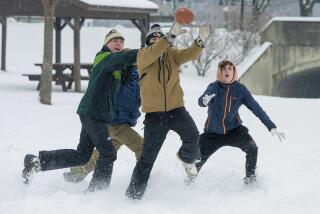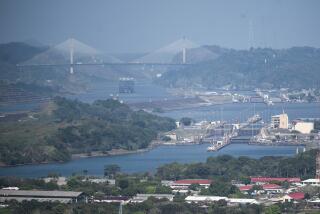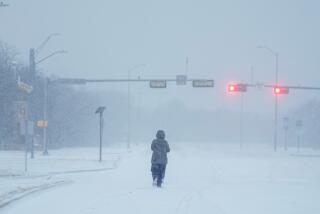Cold Disrupts River Traffic, Water Supplies : Weather: Barges and boats are slowed or halted by ice in the South and Northeast. Plumbers repair pipes that burst during record lows.
Waterways frozen by record low temperatures in the South and Northeast slowed shipping Wednesday, while plumbers worked overtime to repair thousands of water pipes that burst when they froze.
Ice on the Mississippi River forced the Coast Guard to ban nighttime barge traffic from Cairo, Ill., to the Arkansas-Louisiana border, delaying shipments of heating oil, coal and grain.
The restrictions will be imposed indefinitely along the 450-mile stretch of the river, where 10 barges have run aground since Christmas Day, Lt. Cmdr. Rick Kowalewski said. Chunks of ice floating downstream have knocked over buoys marking the navigation channel, he said.
“That’s one of the reasons why we are allowing only daylight operation,” Kowalewski said. “They (the buoys) are hard to use during the day, and impossible at night.”
In the East, this is turning out to be the iciest winter on Chesapeake Bay since 1976-77, with foot-thick ice in places. In 1976, much of the estuary froze.
The Coast Guard has been hampered in its efforts to clear shipping lanes because the four ships it used for ice-breaking are in for repairs, said Lt. Cmdr. Steven Waldmann.
Farther north in Pennsylvania, up to a half-foot of ice on Pittsburgh’s three rivers has brought barge and boat traffic to a virtual standstill. Ice covers at least 70% of the Allegheny, Monongahela and Ohio rivers.
Meanwhile, homeowners and plumbers in Houston were working as fast as they could to repair thousands of pipes broken during three days of record-setting lows.
Houston officials said that, by midday Wednesday, water pressure in the city was up to 80% as leaks were gradually plugged.
In Jackson, Miss., Mayor Kane Ditto said crews working to restore service to the remainder of 60,000 homes and businesses that had been without water were still finding new problems. He said there were 33 breaks in Jackson’s 900 miles of water lines Wednesday morning, up from 10 the night before.
The 50,000 residents of New Orleans’ public housing projects have had little or no water. City officials said water pressure dropped from a normal 65 pounds per square inch to about 47 because of pipe breaks.
The Louisiana freeze, called the harshest of this century by meteorologists, sent temperatures below 32 degrees for almost 82 hours in New Orleans and below 15 degrees for 15 hours.
In addition to ravaging citrus trees, the freeze hit the Louisiana fishing industry hard.
“Not only are there thousands of frozen fish in the marshes, but we also have oysters frozen in their shells. The seafood has been totally spoiled, ruined,” said Joe Buras, president of the Delta Commercial Fishermen’s Assn. of Plaquemines Parish.
More to Read
Sign up for Essential California
The most important California stories and recommendations in your inbox every morning.
You may occasionally receive promotional content from the Los Angeles Times.










